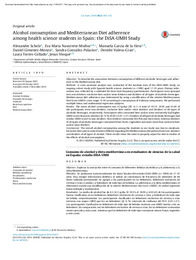Por favor, use este identificador para citar o enlazar este ítem:
https://hdl.handle.net/11000/38515Registro completo de metadatos
| Campo DC | Valor | Lengua/Idioma |
|---|---|---|
| dc.contributor.author | Scholz, Alexander | - |
| dc.contributor.author | Navarrete-Muñoz, Eva María | - |
| dc.contributor.author | Garcia de la Hera, Manuela | - |
| dc.contributor.author | Gimenez-Monzo, Daniel | - |
| dc.contributor.author | González Palacios, Sandra | - |
| dc.contributor.author | Valera-Gran, Desirée | - |
| dc.contributor.author | Torres-Collado, Laura | - |
| dc.contributor.author | Vioque, Jesús | - |
| dc.contributor.other | Departamentos de la UMH::Salud Pública, Historia de la Ciencia y Ginecología | es_ES |
| dc.date.accessioned | 2025-11-26T13:15:23Z | - |
| dc.date.available | 2025-11-26T13:15:23Z | - |
| dc.date.created | 2016 | - |
| dc.identifier.citation | Gac Sanit. 2016 Mar-Apr;30(2):126-32 | es_ES |
| dc.identifier.issn | 1578-1283 | - |
| dc.identifier.issn | 0213-9111 | - |
| dc.identifier.uri | https://hdl.handle.net/11000/38515 | - |
| dc.description.abstract | Objective: To describe the association between consumption of different alcoholic beverages and adherence to the Mediterranean diet. Methods: A cross-sectional analysis was conducted of the baseline data of the DiSA-UMH study, an ongoing cohort study with Spanish health science students (n=1098) aged 17-35 years. Dietary information was collected by a validated 84-item food frequency questionnaire. Participants were grouped into non-drinkers, exclusive beer and/or wine drinkers and drinkers of all types of alcoholic beverages. Mediterranean diet adherence was determined by using a modification of the relative Mediterranean Diet Score (rMED; score range: 0-16) according to consumption of 8 dietary components. We performed multiple linear and multinomial regression analyses. Results: The mean alcohol consumption was 4.3g/day (SD: 6.1). A total of 19.5%, 18.9% and 61.6% of the participants were non-drinkers, exclusive beer and/or wine drinkers and drinkers of all types of alcoholic beverages, respectively. Participants who consumed beer and/or wine exclusively had higher rMED scores than non-drinkers (β: 0.76, 95%CI: 0.25-1.27). Drinkers of all types of alcoholic beverages had similar rMED scores to non-drinkers. Non-drinkers consumed less fish and more meat, whereas drinkers of all types of alcoholic beverages consumed fewer fruits, vegetables and more meat than exclusive beer and/or wine drinkers. Conclusions: The overall alcohol consumption among the students in our study was low-to-moderate. Exclusive beer and/or wine drinkers differed regarding the Mediterranean diet pattern from non-drinkers and drinkers of all types of alcohol. These results show the need to properly adjust for diet in studies of the effects of alcohol consumption. | es_ES |
| dc.format | application/pdf | es_ES |
| dc.format.extent | 7 | es_ES |
| dc.language.iso | eng | es_ES |
| dc.publisher | Elsevier | es_ES |
| dc.rights | info:eu-repo/semantics/openAccess | es_ES |
| dc.rights | Attribution-NonCommercial-NoDerivatives 4.0 Internacional | * |
| dc.rights.uri | http://creativecommons.org/licenses/by-nc-nd/4.0/ | * |
| dc.subject | Alcohol drinking | es_ES |
| dc.subject | Alcoholic beverages | es_ES |
| dc.subject | Students | es_ES |
| dc.subject | Diet | es_ES |
| dc.subject | Mediterranean Diet | es_ES |
| dc.subject | Health occupations | es_ES |
| dc.title | Alcohol consumption and Mediterranean Diet adherence among health science students in Spain: the DiSA-UMH Study | es_ES |
| dc.type | info:eu-repo/semantics/article | es_ES |
| dc.relation.publisherversion | 10.1016/j.gaceta.2015.10.011 | es_ES |

Ver/Abrir:
Alcohol consumption and Mediterranean Diet adherence.pdf
337,96 kB
Adobe PDF
Compartir:
 La licencia se describe como: Atribución-NonComercial-NoDerivada 4.0 Internacional.
La licencia se describe como: Atribución-NonComercial-NoDerivada 4.0 Internacional.
.png)